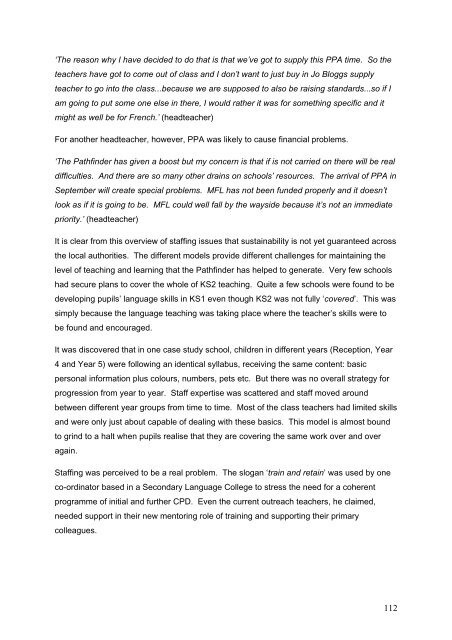Evaluation of the Key Stage 2 Language Learning Pathfinders
Evaluation of the Key Stage 2 Language Learning Pathfinders
Evaluation of the Key Stage 2 Language Learning Pathfinders
You also want an ePaper? Increase the reach of your titles
YUMPU automatically turns print PDFs into web optimized ePapers that Google loves.
‘The reason why I have decided to do that is that we’ve got to supply this PPA time. So <strong>the</strong>teachers have got to come out <strong>of</strong> class and I don’t want to just buy in Jo Bloggs supplyteacher to go into <strong>the</strong> class...because we are supposed to also be raising standards...so if Iam going to put some one else in <strong>the</strong>re, I would ra<strong>the</strong>r it was for something specific and itmight as well be for French.’ (headteacher)For ano<strong>the</strong>r headteacher, however, PPA was likely to cause financial problems.‘The Pathfinder has given a boost but my concern is that if is not carried on <strong>the</strong>re will be realdifficulties. And <strong>the</strong>re are so many o<strong>the</strong>r drains on schools’ resources. The arrival <strong>of</strong> PPA inSeptember will create special problems. MFL has not been funded properly and it doesn’tlook as if it is going to be. MFL could well fall by <strong>the</strong> wayside because it’s not an immediatepriority.’ (headteacher)It is clear from this overview <strong>of</strong> staffing issues that sustainability is not yet guaranteed across<strong>the</strong> local authorities. The different models provide different challenges for maintaining <strong>the</strong>level <strong>of</strong> teaching and learning that <strong>the</strong> Pathfinder has helped to generate. Very few schoolshad secure plans to cover <strong>the</strong> whole <strong>of</strong> KS2 teaching. Quite a few schools were found to bedeveloping pupils’ language skills in KS1 even though KS2 was not fully ‘covered’. This wassimply because <strong>the</strong> language teaching was taking place where <strong>the</strong> teacher’s skills were tobe found and encouraged.It was discovered that in one case study school, children in different years (Reception, Year4 and Year 5) were following an identical syllabus, receiving <strong>the</strong> same content: basicpersonal information plus colours, numbers, pets etc. But <strong>the</strong>re was no overall strategy forprogression from year to year. Staff expertise was scattered and staff moved aroundbetween different year groups from time to time. Most <strong>of</strong> <strong>the</strong> class teachers had limited skillsand were only just about capable <strong>of</strong> dealing with <strong>the</strong>se basics. This model is almost boundto grind to a halt when pupils realise that <strong>the</strong>y are covering <strong>the</strong> same work over and overagain.Staffing was perceived to be a real problem. The slogan ‘train and retain’ was used by oneco-ordinator based in a Secondary <strong>Language</strong> College to stress <strong>the</strong> need for a coherentprogramme <strong>of</strong> initial and fur<strong>the</strong>r CPD. Even <strong>the</strong> current outreach teachers, he claimed,needed support in <strong>the</strong>ir new mentoring role <strong>of</strong> training and supporting <strong>the</strong>ir primarycolleagues.112

















